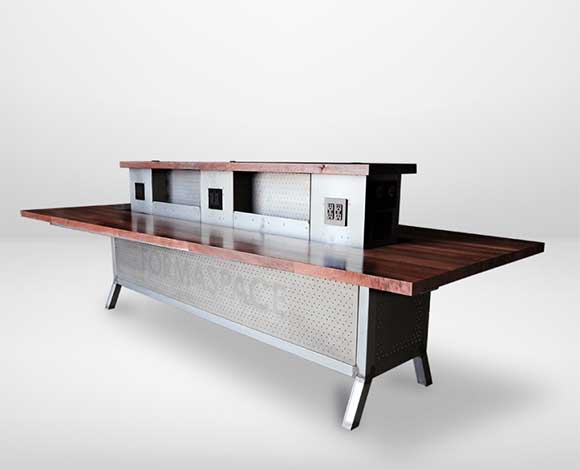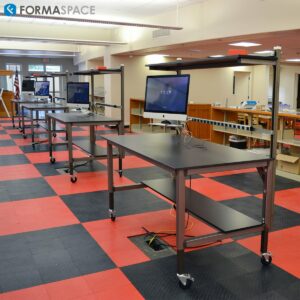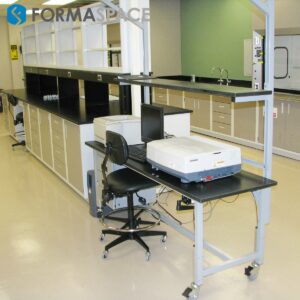According to one analyst, as many as 26 billion Internet of Things (IoT) devices will be connected to smart furniture products by the year 2024. On the week after the CES 2018 consumer electronics show in Las Vegas, we take a look at the way smart office products are making offices a healthier, more convenient, and productive place to work than ever before.
The technology analyst firm Research Nestor predicts that smart furniture demand will increase sharply between now and the middle of the next decade, with as many as 26 billion IoT (Internet of Things) devices connecting to smart furniture products by the year 2024.
If this prediction pans out, it will be following a classic “hockey stick” adoption model that’s typical of many successful tech products — a long, slow, early adoption curve (representing the handle of the stick) is followed by a sharp upward curve (the blade) as the buyer profile shifts from early adopters to mainstream consumers.
Where are we in this cycle? As it turns out, we’re about 14 years into the smart furniture era. Pioneering Japanese researcher Hideyuki Tokuda of Keio University presented one of the first conference papers on the idea of connected smart furniture back in 2004 at an IEEE conference in Tokyo. In his research lab, Tokuda identified how networked computers, sensors, and i/o devices, such as touch screens, would need to work together to provide new convenience and productivity features, such as keyless access, private message boards, and remote control video systems controlled by cell phones.
So if you are a business owner or office manager, what does the adoption of smart furniture mean for you in today’s office environments? Are you a die-hard early adopter or are you looking in from the sidelines to see if smart office products are for you?
To help you decide, we’ve broken the topic of smart furniture down into four categories:
- Smart Office Desks Bring Health and Wellness Benefits to the Office
- Flexibility, Thanks to Multi-Function Smart Furniture
- Using Data Collected by Smart Furniture to Measure Activity at the Office
- Future Developments in Smart Office Products
Smart Office Desks Bring Health and Wellness Benefits to the Office
By now, you’ve probably read that sitting for too many hours during the day could be as deadly to your health as smoking cigarettes.
Smart office desks from Formaspace Office can help. You and your employees can start the day off right with our Weldmarx line of sit-to-stand desks. Our smart office desks can adjust up or down to your preferred height as you walk toward them first thing in the morning — by using a blue-tooth enabled app on your phone. During the day, use your phone or a desk-mounted pushbutton control to move the whole desk up or down in order to avoid sitting too long in one position at work.
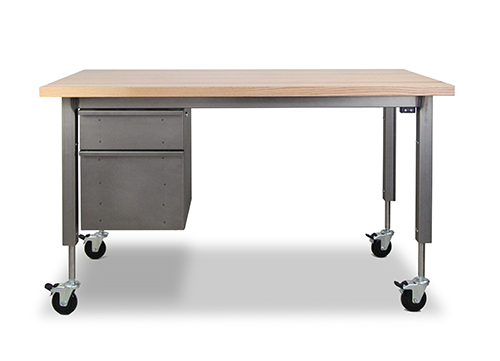
If you’re not getting enough exercise at work, here are some additional ideas. Two Formaspace tables can be joined together for an impromptu game of office ping pong! These smart tables are also connected to an app on your phone by a Bluetooth connection, so you can raise and lower them for use as desks or tables.
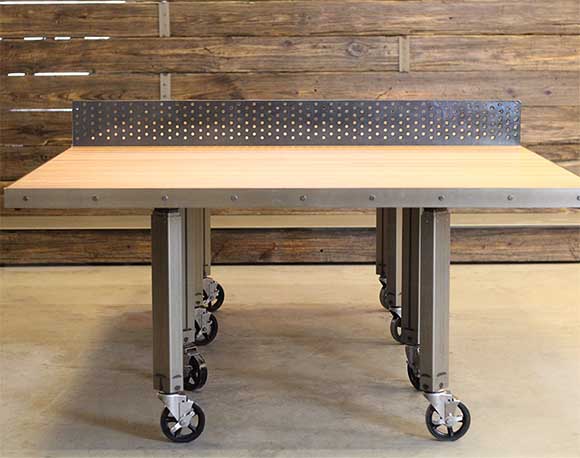
Our custom smart ping pong table was one of the big hits at our 2017 NeoCon Office Furniture display booth.
If you don’t have time to take a break from your desk to play a game of ping pong, you can get a workout at your desk when it’s equipped with a built-in exercise treadmill. Even walking at a slow pace can help you lose pounds and keep trim while you work.
Feeling blue at the office during the winter? Smart furniture products can not only sense the temperature and humidity at your desk to keep you comfortable (by silently alerting the HVAC computer that a person is occupying the desk), they can also turn on special solar-style lights to help combat Seasonal Affective Disorder (SAD) brought on by dark winter days.
Flexibility, Thanks to Multi-Function Smart Furniture
Smart furniture can also make you more productive by integrating existing functions.
For example, aren’t you tired of seeing cables and wires in the office tangled up everywhere?
We offer a solution.
Our no-wires charging panels allow you to simply place a smartphone on one of our desks or tables — it will charge up automatically with no wires required. We also offer integrated power supply outlets as well as USB power and networking ports in our office furniture — say goodbye to the visual clutter of wires as well as dangerous trip hazards, such as extension cords and plug adapters.
For extra simplicity and clean lines, choose our motorized access solutions as shown in this bespoke Formaspace conference table above. At the touch of a button, motorized compartments can open up for easy access to network connections and power supplies, but when they are no longer needed, they can be stowed away for a clean, clutter-free look.
Taking this a step further, what if you wanted your home office to be able to be reconfigured into a meeting space, a kitchen/dining area or a bedroom?
Check out this video from Ori Systems:
Ori Systems uses clever space planning and mechanical sliding systems to alter the core furniture system into many different functional configurations.
Professor Carlo Ratti, Director of MIT’s Senseable City Lab and founder of Studio Carlo Ratti Associati, has his own futuristic take on smart office furniture. He has designed a system of individual motorized components, called “Lift-Bits,” that can move up and down to form a variety of seating options for your collaboration area or break room — from lounge chairs to large, comfortable couches suitable for impromptu meetings.
Using Data Collected by Smart Furniture to Measure Activity at the Office
In an effort to reduce healthcare costs, many employers are encouraging employees to use activity trackers, such those from Fitbit or Apple, and to encourage them to be more physically active.
Smart furniture manufacturers, such as Hermann Miller, have introduced software systems that can track the activity of employees working at their desks, to gain insight into aggregate data, such as how many hours are employees sitting, moving around or standing at their desks.
Steelcase is also looking at ways to use smart furniture to track employees at the office. Their Steelcase Workplace Adviser uses sensors built into the furniture to keep tabs on where people are located throughout the work day; the information is sent to the cloud. With this information at hand, office managers and space planners can gain insight on information, such as which areas have high (or low) occupancy during different times of the day.
Future Developments in Smart Office Products
What new developments will we see at CES 2018 next week?
One safe prediction is more integration of consumer electronics into furniture products found in collaboration zones and conference rooms. Large touchscreens will become more common as businesses invest in telepresence tools that connect employees around the world. Virtual reality / augmented reality visualization tools will continue to expand beyond their entertainment roots to help businesses visualize complicated processes and discover unexpected insights found in big-data sets.
Here’s another prediction, taken from the automotive industry: air-conditioned and heated seating. In a car, it’s more energy efficient and faster to heat and cool the seats, so we may find this innovation working its way into the office furniture market at some point in the future.
What about self-leveling furniture? How many times have you moved furniture to an uneven floor and found that it rocks or pens roll off the desk? Built-in level detectors could automatically adjust the height of the legs to maintain a solid, level surface.
Finally, we can’t overlook major changes that are coming to the way that we design, specify, and purchase smart office products in the future.
For example, here at Formaspace, we’ve been working on an easy-to-use, browser-based virtual reality app that lets you design and configure your furniture online. Try out our new 3DConfigure tool here! As you specify optional components, such as monitor stands and power connections, or select different work surface materials (including hardwoods, such as maple or walnut hardwood), the furniture updates instantly on screen.
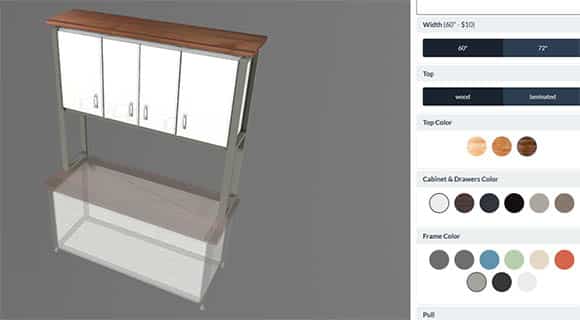
Other companies, such as the German firm imos, are also looking at ways to use virtual reality platforms, such as the STEAM gaming platform, to speed up furniture design. While collective design advocates at OpenStructures are using open source methods to create furniture components that can be 3D printed and shared.
Join the Smart Furniture Revolution
We’ll be looking over the latest developments from Las Vegas at the CES 2018 consumer electronics show next week with great interest.
Meanwhile, why don’t you join us here at Formaspace and be part of the smart furniture revolution?
Our Weldmarx line of furniture from Formaspace Office is just what you are looking for.
Speak to a Formaspace Design Consultant today to talk about your needs and to find out more. Simply fill out the quick contact form below to get the conversation started.
The article was originally posted on Formaspace Office website.


